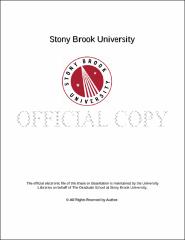| dc.identifier.uri | http://hdl.handle.net/11401/77461 | |
| dc.description.sponsorship | This work is sponsored by the Stony Brook University Graduate School in compliance with the requirements for completion of degree. | en_US |
| dc.format | Monograph | |
| dc.format.medium | Electronic Resource | en_US |
| dc.language.iso | en_US | |
| dc.publisher | The Graduate School, Stony Brook University: Stony Brook, NY. | |
| dc.type | Dissertation | |
| dcterms.abstract | Real-time localization and tracking of people and assets within buildings is in high demand in many applications. These tasks are very challenging in indoor environments due to the physics of signal propagation and the multi-path interference. Satellite-based technologies such as the Global Positioning Systems (GPS) are notoriously unreliable in indoor environments. As a result, a variety of novel technologies have been developed to fill this gap. This dissertation focuses on the use of binary information for indoor localization and tracking, and in particular, on the use of the Ultra High Frequency (UHF) Radio Frequency Identification (RFID) technology. RFID is a rapidly growing technology that uses electromagnetic fields in the radio frequency range to transfer data. It greatly motivates and drives the research in indoor localization and tracking. The main contribution of this dissertation is a novel framework for indoor localization and tracking based on binary information. Binary information indicates whether a device is present or absent within a predefined area. New models and Bayesian-based methods are proposed and investigated, primarily in the context of RFID systems composed of readers and tags. One novelty represents models of probabilities of tag detection. It also includes variability of this probability. For tracking, we propose the use of a particle filtering algorithm that operates on asynchronous data. In order to improve the tracking performance, especially in areas with intersections and at portals, novel tags called sense-a-tags (STs) with ability to detect other tags are added to the standard RFID system. The STs can passively detect and decode backscatter signals from tags in their proximity. With the proximity information provided by the STs, the system can improve the localization accuracy and can unambiguously estimate the direction of movement of a tagged object. Constrained by the cost and energy requirements, a novel system containing no RFID readers is proposed. This system is composed of tags with capability of tag-to-tag communication. The tags can broadcast information to neighboring tags by backscattering. A real-time self-locating problem is formulated in this reader-free system and algorithms using binary information with low computational complexity are investigated. These algorithms preserve high accuracy in their performance. Stimulated by the requirements of low energy consumption, robustness against node failure, and scalability, non-centralized processing has gained a great interest in recent years. Simple low-cost devices with capability of communicating among themselves greatly promotes the development of non-centralized processing in wide applications. A non-centralized tracking problem with networks of binary directional sensors is presented and its extension to the novel reader-free RFID system is discussed. | |
| dcterms.available | 2017-09-20T16:52:44Z | |
| dcterms.contributor | Bugallo, Monica | en_US |
| dcterms.contributor | Djuric, Petar | en_US |
| dcterms.contributor | Robertazzi, Thomas | en_US |
| dcterms.contributor | Das, Samir. | en_US |
| dcterms.creator | GENG, LI | |
| dcterms.dateAccepted | 2017-09-20T16:52:44Z | |
| dcterms.dateSubmitted | 2017-09-20T16:52:44Z | |
| dcterms.description | Department of Electrical Engineering. | en_US |
| dcterms.extent | 141 pg. | en_US |
| dcterms.format | Monograph | |
| dcterms.format | Application/PDF | en_US |
| dcterms.identifier | http://hdl.handle.net/11401/77461 | |
| dcterms.issued | 2015-12-01 | |
| dcterms.language | en_US | |
| dcterms.provenance | Made available in DSpace on 2017-09-20T16:52:44Z (GMT). No. of bitstreams: 1
GENG_grad.sunysb_0771E_12477.pdf: 5745021 bytes, checksum: d7b93543b9f7603c83de85143c139507 (MD5)
Previous issue date: 1 | en |
| dcterms.publisher | The Graduate School, Stony Brook University: Stony Brook, NY. | |
| dcterms.subject | Electrical engineering | |
| dcterms.subject | binary information, indoor localization and tracking, Particle Filtering, RFID systems | |
| dcterms.title | INDOOR LOCALIZATION AND TRACKING USING BINARY INFORMATION | |
| dcterms.type | Dissertation | |

